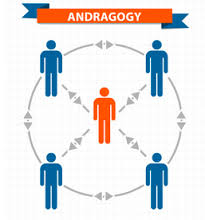September 2009 - The FoCuSeD™ Facilitator eNewsletter

Facilitation and "Andragogy" - Adult Learning | Gary Rush Facilitation
When I look at a definition of Facilitation – “The art and science of helping groups accomplish tasks”, and the definition of Andragogy* – Adult Learning – “The art and science of helping adults learn” – I see similarities. Both roles help others and both require understanding of how people think, learn, and interact with each other. I want to explore what I can learn as a Facilitator (helping groups accomplish tasks) from an Andragogist (helping adults learn) – a “Facilitative Trainer”.
Core Competencies
According to Robert Eichinger and Michael Lombardo of Lominger Limited, Inc. in their work, Leadership Architect, the Core Competencies for a successful teacher are:
- Functional / Technical Skills
- Drive for results
- Learning on the fly
- Planning
- Time Management
- Motivating Others
- Integrity and Trust
- Listening
- Personal Learning and Development
- Valuing Diversity
- Interpersonal Skills
- Managing and Measuring Work
- Presentation Skills
- Written Communications
All but one of the core competencies above – Functional / Technical Skills – fit within the Facilitator Core Competencies (see “Becoming a Certified Professional Facilitator”). This is because Facilitators do not need to know content – they are content-neutral, whereas teachers need to know content – they are content experts. Apart from that, how we work with our participants/students should be pretty much the same.
Adult Learning – Andragogy
In designing training programs, Andragogists – Facilitative Trainers – begin by approaching adults as thinkers. They assume that adult learners are self-directed, they bring experience that relates to the training, they need the training to be related to their role and immediately applicable, and that they are internally motivated.
Facilitative Trainers are aware of the different intelligences – linguistic, mathematical, spatial, musical, kinesthetic, empathic, and self-awareness – so that they design effective programs catering to all students. In designing the training delivery, Facilitative Trainers ensure that all three learning styles – visual, auditory, and kinesthetic – are addressed. They use slides, flip charts, reading, and demonstrations to include visual learners. They use lectures, group discussion, conversations, and stories to include auditory learners. Finally, they use role-playing, simulations, practice, and writing to include kinesthetic learners.
In addition, Facilitative Trainers create a safe environment because adults learn better when they have permission to fail followed by positive reinforcement – we learn best by doing.
Impact on Workshop Process Design
In our role as Facilitators, we should incorporate concepts of adult learning into our workshops and process design. We take our cue from Facilitative Trainers. Facilitators must approach their participants with the same assumptions – they are thinkers; they are self-directed; they bring experience that relates to the workshop; whatever they do in the workshop must relate to their role and be immediately applicable; and that they need to be internally motivated to participate effectively. We then design processes to ensure that we include everyone and everyone’s learning style. We need to ensure that we don’t marginalize those whose intelligence or learning style is different than others. In the workshop, we need to:
- Assume that:
- Participants need to be involved – both physically and mentally.
- Participants need to include their experiences in the discussion. Stories, anecdotes, and history are important.
- Whatever is decided in a workshop needs immediate application – otherwise the motivation is lost.
- Design processes that:
- Include a variety of media – visual aids such as slides, posters, and flip charts.
- Include time for discussions, time-out, role-playing, and simulations.
- Include music and space for movement and visual and auditory impact.
- Include exercises to enable participants to get to know themselves and each other.
- Provide safety and encourage permission to fail – critical in developing creative solutions.
Note: Be aware of participants and how they are reacting. If someone is dropping out, perhaps he or she isn’t being stimulated sufficiently. Adjust the process to be more inclusive.
Conclusion
As Facilitators we can learn a lot from effective Facilitative Trainers just as Facilitative Trainers can learn a lot from Facilitators. We deal largely with adults who bring a variety of needs. One process doesn’t fit all and through effective and thorough preparation – we can design processes that are inclusive, engaging, and enable creativity. ![]()
*Andragogy is a term defined in 1968 by Malcolm Knowles, considered to be the father of Adult Learning.

